DARTs Financial Status PowerPoint PPT Presentation
1 / 31
Title: DARTs Financial Status
1
DARTs Financial Status
- T-FLEx Spring Conference
- Las Vegas
- April 5, 2006
2
Purpose of the Financial Plan
- To validate the affordability of DARTs
long-range Transit System Plan, including the
Agencys commitments for future expansion and the
issuance and repayment of debt.
3
Illustrated View of the Financial Plan
Ridership/ Operating Revenues
Service Levels
Inflation
Financial Plan
Operating Expenses
LRT Phase II
Debt Service
Capital Programs
Federal Funds
Sales Taxes
Interest Rates
4
Sales Taxes
- Components of Future Sales Tax Growth
- Inflation
- Regional Population Growth
- Real Economic Growth
5
Projected Sales Tax Receipts(2005 2024)
5.8 B
Billions
6
Other Sources of Funds
- Operating Revenues
- Interest Income
- Federal Funds (Formula Discretionary)
- Debt
- Other (Contributions)
7
Uses of Funds (In Millions)
8
Impact of a 1 Million Increase in Fiscal Year
2006 ( in millions)
9
FY04 Financial Plan Affordability
10
FY05 Financial Plan Affordability
11
FY06 Financial Plan Affordability
12
Operational Cost Drivers
13
FY 2006 Operating Budget323.9 Million
- Direct Service Costs (66 - 215M)
- Costs directly related to providing
transportation service to the customer - Indirect Service Costs (25 - 81M)
- Costs that are one step removed from direct
costs generally impact service quality - General Administrative (GA) (9 - 28M) Costs
not directly related to service but provide
essential business functions
14
Direct Service Costs
- Primary Cost Driver Service Levels
- Hours operator wages benefits
- Miles maintenance wages benefits, fuel,
parts, maintenance service contracts
15
Direct Service Costs(Continued)
- Secondary Cost Drivers
- Service Characteristics Schedule Efficiency
- Deadhead Ratio (18.5)
- Peak-to-Base Ratio (2.3 to 1)
- Span of Service (330 AM 150 AM)
- Age of Fleet (5-6 years)
- Quality Standards
- Wage Rates
- Benefits
- Fuel Prices
- Position Vacancy Rates
- Work Rules
- Absenteeism (Extraboard)
16
Direct Service Costs(Continued)
- Purchased Transportation Contract Rates (CR,
Para, HOV) - Acceptable Load Factor (LRT)
- Cost Sharing with FWTA (CR)
- Zero Trip Denials (Para)
- Certification Process (Para)
- Type of Facility (HOV)
17
Indirect Service Costs
- Primary Cost Drivers
- Service Levels
- Service Quality
- Components
- Transportation Ops Field Supervision
- DART Police / Security
- Maintenance Supervision Facility Maintenance
- Direct Customer Marketing
- Materials Management
- Paratransit (scheduling, dispatch, etc.)
- Planning (service planning scheduling)
- Risk Management/Safety/Insurance
- Finance (revenue collection, yard control, pass
distribution) - Other (IT Ops, Ops Tech, Commuter Rail Ops,
Project Mgt, etc.)
18
General Administrative Costs
- Primary Cost Drivers number of transactions,
processes, and projects - Major Components
- Agency-wide information systems
- Marketing Communications
- Human Resources
- Executive, DEO, Audit, Board Support
- Procurement
- Finance
- Legal
- Risk Management
- Other (EVP Ops, EVP Program Development, Commuter
Rail Admin)
19
Compensation Benefits
20
Salaries, Wages and Benefits as a Percentage of
the Budget
Other - 33 (106.3 M)
Salaries Wages - 46 (150.1 M)
Benefits - 21 (67.5 M)
21
Operator, Non-Operator and Salaried Wages
22
Hourly vs. Salaried Compensation FY04
- 49,205 - Median Hourly Compensation
- 52,366 - Median Salaried Compensation
- Employees with at least 1872 pay hours (90 of
2080) - Includes all pay including OT, Bonuses
- Does not include such things as tuition
reimbursement, uniform and tool allowances, etc. - The Median is the center value. Half of the
employees are above the median, half are below
the median.
23
FY06 Budget Benefits (67.5 million)
24
Consumer Price Index
25
Wage Inflation vs. CPI
26
Benefits Escalation Summary
27
Purchased Transportation (PT) Escalation
- 20.5 M - Paratransit contract (including
On-Call) - 4 for FY06, re-bid after that exact
escalation unknown - 14.8 M - TRE contract No Escalation for FY06
FY07 4 per year thereafter - Combined PT Budget - 35.3 M
28
Budgetary Example
29
Budgetary Example(Millions)
30
The Transit Environment Recent Headlines
- Transit fares to rise by 25 cents San Diego
(3/03) - Warning of Budget Gap, M.T.A. May Pare Metrocard
Discounts New York (10/03) - Despite fare increases, BART faces big deficit
San Francisco (BART) (2/04) - SEPTA Details Proposed Cuts Philadelphia
(11/04) - Muni chief suggests increase in taxes to cut
agency deficit San Francisco (Muni) (12/04) - Pittsburgh rail transit fares become nations
most costly Pittsburgh (12/04) - Budget Gap Threatens Chicago Transit Chicago
(4/05)
31
Competing Priorities
Accelerate LRT Build-out
Address Employee Compensation / Satisfaction
Increase Ridership / Expand Services
Improve Service Quality / Safety / Security
Cut the Operating Budget
DARTs Challenges
Increase Stakeholder Satisfaction
Enhance Internal Controls
Maintain Existing Infrastructure
Minimize Fare Increases
Minimize/Eliminate Debt

